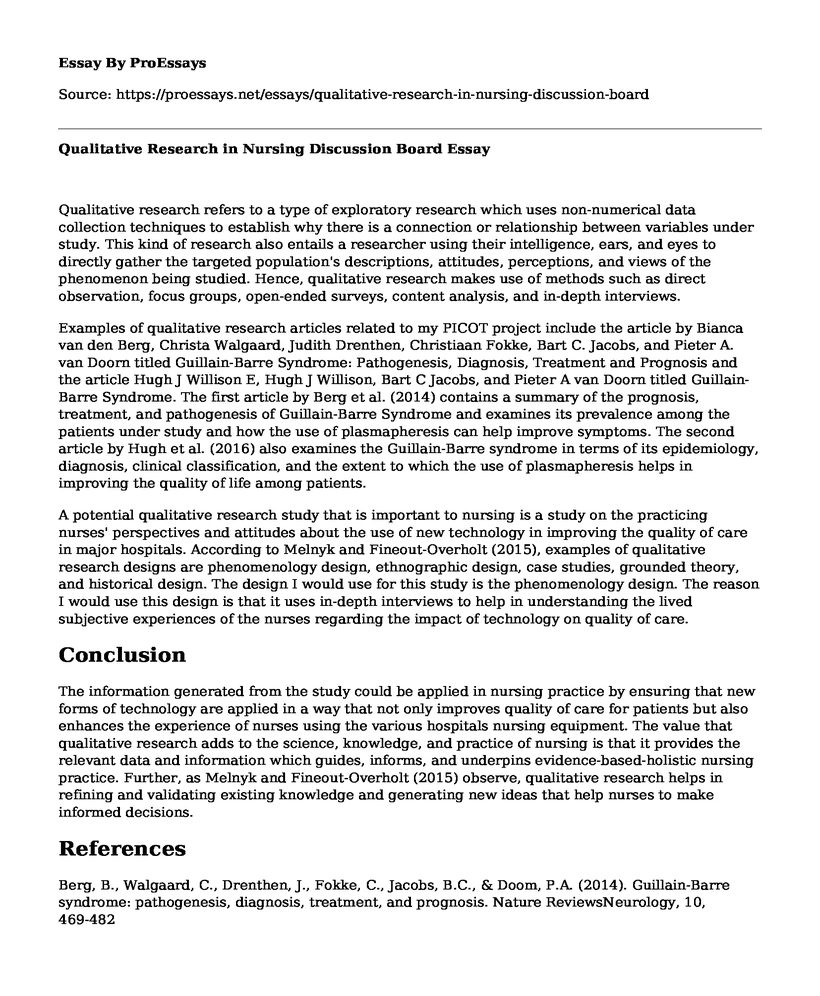Qualitative research refers to a type of exploratory research which uses non-numerical data collection techniques to establish why there is a connection or relationship between variables under study. This kind of research also entails a researcher using their intelligence, ears, and eyes to directly gather the targeted population's descriptions, attitudes, perceptions, and views of the phenomenon being studied. Hence, qualitative research makes use of methods such as direct observation, focus groups, open-ended surveys, content analysis, and in-depth interviews.
Examples of qualitative research articles related to my PICOT project include the article by Bianca van den Berg, Christa Walgaard, Judith Drenthen, Christiaan Fokke, Bart C. Jacobs, and Pieter A. van Doorn titled Guillain-Barre Syndrome: Pathogenesis, Diagnosis, Treatment and Prognosis and the article Hugh J Willison E, Hugh J Willison, Bart C Jacobs, and Pieter A van Doorn titled Guillain-Barre Syndrome. The first article by Berg et al. (2014) contains a summary of the prognosis, treatment, and pathogenesis of Guillain-Barre Syndrome and examines its prevalence among the patients under study and how the use of plasmapheresis can help improve symptoms. The second article by Hugh et al. (2016) also examines the Guillain-Barre syndrome in terms of its epidemiology, diagnosis, clinical classification, and the extent to which the use of plasmapheresis helps in improving the quality of life among patients.
A potential qualitative research study that is important to nursing is a study on the practicing nurses' perspectives and attitudes about the use of new technology in improving the quality of care in major hospitals. According to Melnyk and Fineout-Overholt (2015), examples of qualitative research designs are phenomenology design, ethnographic design, case studies, grounded theory, and historical design. The design I would use for this study is the phenomenology design. The reason I would use this design is that it uses in-depth interviews to help in understanding the lived subjective experiences of the nurses regarding the impact of technology on quality of care.
Conclusion
The information generated from the study could be applied in nursing practice by ensuring that new forms of technology are applied in a way that not only improves quality of care for patients but also enhances the experience of nurses using the various hospitals nursing equipment. The value that qualitative research adds to the science, knowledge, and practice of nursing is that it provides the relevant data and information which guides, informs, and underpins evidence-based-holistic nursing practice. Further, as Melnyk and Fineout-Overholt (2015) observe, qualitative research helps in refining and validating existing knowledge and generating new ideas that help nurses to make informed decisions.
References
Berg, B., Walgaard, C., Drenthen, J., Fokke, C., Jacobs, B.C., & Doom, P.A. (2014). Guillain-Barre syndrome: pathogenesis, diagnosis, treatment, and prognosis. Nature ReviewsNeurology, 10, 469-482
Melnyk, B. & Fineout-Overholt, E. (2015). Evidence-based practice in nursing and
Healthcare: A guide to best practice, 3rd edition. Philadelphia, PA: Wolters Kluwer Health.
Wilson, H.J., Jacobs, B.C., & Doorn, P.A. (2016). Guillain-Barre syndrome. The Lancet, 388 (10045), p717-727
Cite this page
Qualitative Research in Nursing Discussion Board. (2022, May 17). Retrieved from https://proessays.net/essays/qualitative-research-in-nursing-discussion-board
If you are the original author of this essay and no longer wish to have it published on the ProEssays website, please click below to request its removal:
- Essay Example: Role of World Health Organization in Public Health
- How Aging, Ethnicity, Life Circumstances and Disease Have Affected an Aging Adult? - Essay Sample
- Breastfeeding and Its Benefits Essay Example
- Forming Health Policy: A Necessary Step for Healthy Nations - Essay Sample
- Paper Example on Lack of Dental Care Access for Hispanics: Barriers and Solutions
- Essay Example: Informed Consent Form: Patient Rights and Obligations
- Report Example: Diana's Battle to Conquer Poor Eating Habits & Reach Dream University







